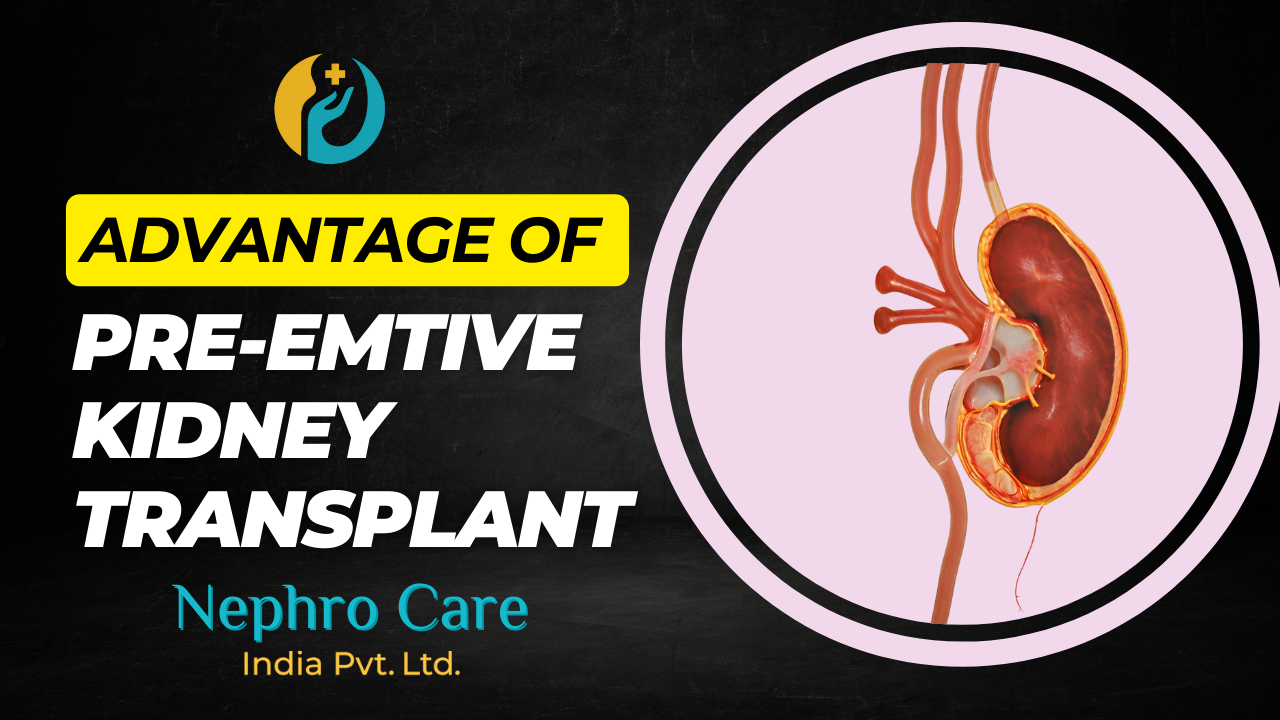
- 868
- 0
The Growing Significance of Preemptive Transplant
Preemptive transplant, a proactive approach in the realm of organ transplantation, involves undergoing a kidney transplant before reaching the stage of dialysis dependency in cases of chronic kidney disease. By opting for preemptive transplant, individuals aim to preserve their kidney function and avoid the potential drawbacks associated with prolonged reliance on dialysis. This proactive strategy not only offers the chance for better long-term outcomes but also enhances the quality of life for recipients, allowing them to regain independence and control over their health. As our understanding of renal care continues to evolve, preemptive transplant emerges as a compelling option in the management of end-stage renal disease, promising improved outcomes and a brighter future for those in need of kidney transplantation.

Let’s delve into why preemptive transplant stands out as a game-changer in the landscape of renal care.
1. Preserving Kidney Function:
Successfully preserving and restoring kidney function is the most important benefit of a preemptive transplant.
Despite saving lives, dialysis has certain drawbacks. Long-term reliance on dialysis can raise the risk of complications and cause a progressive reduction in native kidney function.
Patients can avoid this decline completely by choosing preemptive transplants, which replace the failing kidney with a healthy one before irreversible harm occurs. This preservation of kidney function is important for better long-term outcomes and improved quality of life after transplantation.
2. Enhancing Quality of Life:
Quality of life is a central consideration in the management of ESRD, and preemptive transplant offers a significant advantage in this regard.
Dialysis, with its demanding treatment schedule and associated lifestyle restrictions, can take a toll on patients’ physical and emotional well-being.
By bypassing the need for dialysis and receiving a transplant early on, patients regain a sense of normalcy and independence. They can resume activities they enjoy, pursue meaningful relationships and career opportunities, and reclaim control over their lives.
This improvement in quality of life is perhaps one of the most compelling reasons to consider preemptive transplants.
3. Mitigating Cardiovascular Risks:
Cardiovascular disease represents a significant concern for individuals with ESRD, and preemptive transplant offers a unique advantage in mitigating these risks.
Dialysis, particularly when prolonged, can exacerbate cardiovascular issues due to fluid imbalances, electrolyte disturbances, and vascular changes.
By avoiding or minimizing the duration of dialysis through preemptive transplant, patients reduce the cardiovascular burden on their bodies. Studies have shown that preemptive transplant recipients experience lower rates of cardiovascular events and mortality compared to those who undergo transplantation after dialysis, underscoring the importance of early intervention in preserving heart health.
To learn more about dialysis-related Dos and Don’ts, you can check out our blog 👇
4. Optimizing Timing and Efficiency:
Timing is critical in the management of ESRD, and preemptive transplant offers a more efficient and timely solution compared to transplantation after dialysis initiation.
Preemptive transplant allows patients to receive a kidney transplant before dialysis becomes necessary, minimizing the time spent on dialysis and optimizing outcomes.
This proactive approach ensures that patients undergo transplantation when they are in the best possible condition, maximizing the likelihood of success and reducing the risk of complications associated with prolonged dialysis.
5. Access related Infection
Due to the risk of access-related infections, preemptive transplant emerges as a preferable option compared to dialysis. In dialysis, patients often require regular access points, such as central venous catheters, arteriovenous fistulas, or grafts, which can increase the susceptibility to infections. Central venous catheters, in particular, pose a significant risk due to their direct access to the bloodstream.
Conversely, preemptive transplant eliminates the need for long-term access points, minimizing the risk of access-related infections associated with dialysis procedures.
To learn more about dialysis-related infections, you can check out our blog 👇
6. Long-Term Cost Savings:
From a healthcare economics standpoint, preemptive transplant offers significant long-term cost savings compared to transplantation after dialysis. While the initial costs of transplant surgery and immunosuppressive medications may be higher, preemptive transplant ultimately reduces the need for ongoing dialysis treatments, hospitalizations, and associated complications.
Preemptive transplant is a viable and sustainable approach to controlling end-stage renal disease (ESRD) because healthcare systems can attain better results at a lower total cost by investing in it.
There are several characteristics in which PKT delivers better outcomes.
1) Patients who had a living donor
2) Patients aged younger than 18 years
3) Better educated and full-time workers
4) Patients who have 0-1 HLA antigen mismatches
If you have any questions about preemptive transplant, please don’t hesitate to contact our clinic.
Conclusion
Preemptive transplantation is a proactive and innovative strategy for managing end-stage renal disease. PKT offers a number of benefits.
PKT offers a number of benefits that eventually help patients and healthcare systems alike, including maintaining kidney function, improving quality of life, reducing cardiovascular risks, maximizing timing and efficiency, and producing long-term cost savings. Preemptive transplantation will surely become increasingly important as our knowledge of renal care and transplantation advances, helping to improve outcomes and change the lives of those who suffer from kidney disease.
Comment
Check Your EGFR
***We Promise, no spam!







